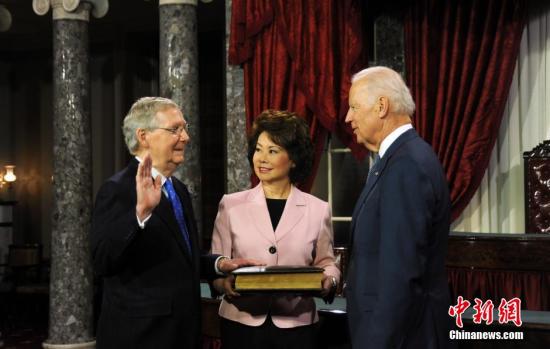Chinanews, October 21st, a comprehensive report, on the 20th local time, the two parties in the United States showed positive signs of negotiations on a new round of economic relief.
The U.S. Democratic House Speaker Pelosi relented on the deadline for the bailout bill, saying that the "deadline" originally set at the 20th would be extended.
And Senate Republican leader McConnell also expressed his willingness to allow the Senate to vote on bills supported by the House of Representatives.
Data map: Pelosi, Speaker of the US House of Representatives.
Photo by China News Agency reporter Sha Hanting
According to reports, Pelosi previously said that the 20th was the deadline for reaching an agreement on the bailout bill before the general election, but she said loosely on the 20th that this is not a dead deadline, but that both parties must propose specific terms and continue. Go on.
In addition, Pelosi also expressed optimism that the two parties reached an agreement.
Pelosi said that the Democratic Party and the White House have further narrowed their differences in the negotiation of a new round of bailout plans, and the two sides are close to reaching an agreement.
She also emphasized that if the new round of bailout plan is to be voted on before the polling day of the US general election, the finalization of the proposal must be completed by this week.
White House Chief of Staff Meadows said that Pelosi and Treasury Secretary Mnuchin had made "good progress" on the 20th, but the two sides "still have a way to go" before reaching an agreement.
According to Pelosi, after the White House raised the bailout to nearly 1.9 trillion U.S. dollars, the biggest differences in negotiations between the two sides still lie in tax credits for poor families, state and local government assistance, and subsidies for businesses. Assistance and responsibility protection.
Pelosi has previously criticized the White House and the Republicans for not understanding the severity of the crisis caused by the epidemic, but Trump has changed his tone in the near future, and even said that "it is necessary to propose a rescue plan larger than the Democrats, but not Every Republican can agree."
The first on the left is McConnell, the leader of the Republican Party in the U.S. Senate.
Photo by Zhang Weiran posted by China News Service
At the same time, the attitude of McConnell, the leader of the Republican Party in the Senate, has also changed.
McConnell said on the 20th that if Pelosi can reach a large-scale rescue plan with the Trump administration, he will arrange for the Senate to vote on the agreement.
Prior to this, McConnell has repeatedly criticized Trump for repeatedly increasing the scale of the bailout, and said that Senate Republicans will not vote on a bailout plan that exceeds $500 billion.
At a press conference on the 20th, McConnell changed his words to reporters and said that the Senate would vote on a bill passed by the House of Representatives "at some point" and supported by US President Trump.
However, McConnell did not indicate whether he would support the possible bill, nor did he promise whether he would persuade enough Republican senators to vote in favor.
The No. 2 Republican in the Senate, John Thun, predicted on the 19th that it would be "difficult" to get enough Republicans to support bills that exceed $1.8 trillion or more.
According to previous reports, since the outbreak of the new crown epidemic, the U.S. Congress has passed four rounds of economic stimulus plans and allocated nearly US$3 trillion, but a number of aids including unemployment insurance have expired in early August.
McConnell announced on October 17 that the Senate would vote on a $500 billion Republican new crown relief bill on the 20th and 21st.
However, the Democrats hope to seek a broader rescue plan, and Pelosi and Mnuchin have been negotiating for this for months.
The US media quoted analysis as saying that if the two parties fail to reach an agreement on a new round of economic stimulus plan in the near future, it may cause the US economy to decline again in the fourth quarter.

